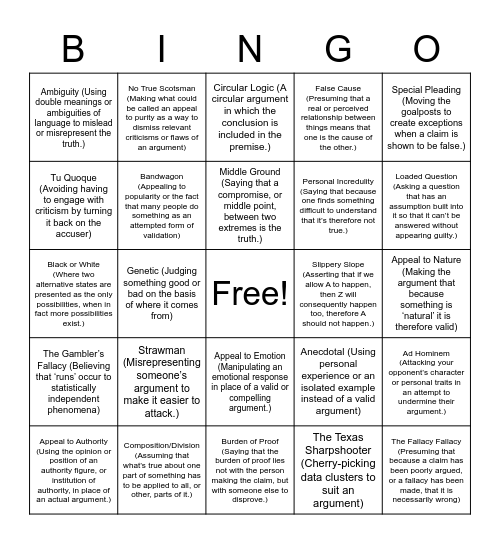

This bingo card has a free space and 24 words: Appeal to Authority (Using the opinion or position of an authority figure, or institution of authority, in place of an actual argument.), Strawman (Misrepresenting someone’s argument to make it easier to attack.), Middle Ground (Saying that a compromise, or middle point, between two extremes is the truth.), The Texas Sharpshooter (Cherry-picking data clusters to suit an argument), Special Pleading (Moving the goalposts to create exceptions when a claim is shown to be false.), Ambiguity (Using double meanings or ambiguities of language to mislead or misrepresent the truth.), No True Scotsman (Making what could be called an appeal to purity as a way to dismiss relevant criticisms or flaws of an argument), Circular Logic (A circular argument in which the conclusion is included in the premise.), Slippery Slope (Asserting that if we allow A to happen, then Z will consequently happen too, therefore A should not happen.), Appeal to Nature (Making the argument that because something is ‘natural’ it is therefore valid), Black or White (Where two alternative states are presented as the only possibilities, when in fact more possibilities exist.), Bandwagon (Appealing to popularity or the fact that many people do something as an attempted form of validation), Anecdotal (Using personal experience or an isolated example instead of a valid argument), Ad Hominem (Attacking your opponent’s character or personal traits in an attempt to undermine their argument.), Tu Quoque (Avoiding having to engage with criticism by turning it back on the accuser), Composition/Division (Assuming that what’s true about one part of something has to be applied to all, or other, parts of it.), Burden of Proof (Saying that the burden of proof lies not with the person making the claim, but with someone else to disprove.), False Cause (Presuming that a real or perceived relationship between things means that one is the cause of the other.), Loaded Question (Asking a question that has an assumption built into it so that it can’t be answered without appearing guilty.), The Gambler’s Fallacy (Believing that ‘runs’ occur to statistically independent phenomena), Genetic (Judging something good or bad on the basis of where it comes from), Appeal to Emotion (Manipulating an emotional response in place of a valid or compelling argument.), Personal Incredulity (Saying that because one finds something difficult to understand that it’s therefore not true.) and The Fallacy Fallacy (Presuming that because a claim has been poorly argued, or a fallacy has been made, that it is necessarily wrong).
Logical Fallacies | Logical Fallacies | Logical Fallacies | Logical Fallacies | Logical Fallacies
Share this URL with your players:
For more control of your online game, create a clone of this card first.
Learn how to conduct a bingo game.
With players vying for a you'll have to call about __ items before someone wins. There's a __% chance that a lucky player would win after calling __ items.
Tip: If you want your game to last longer (on average), add more unique words/images to it.